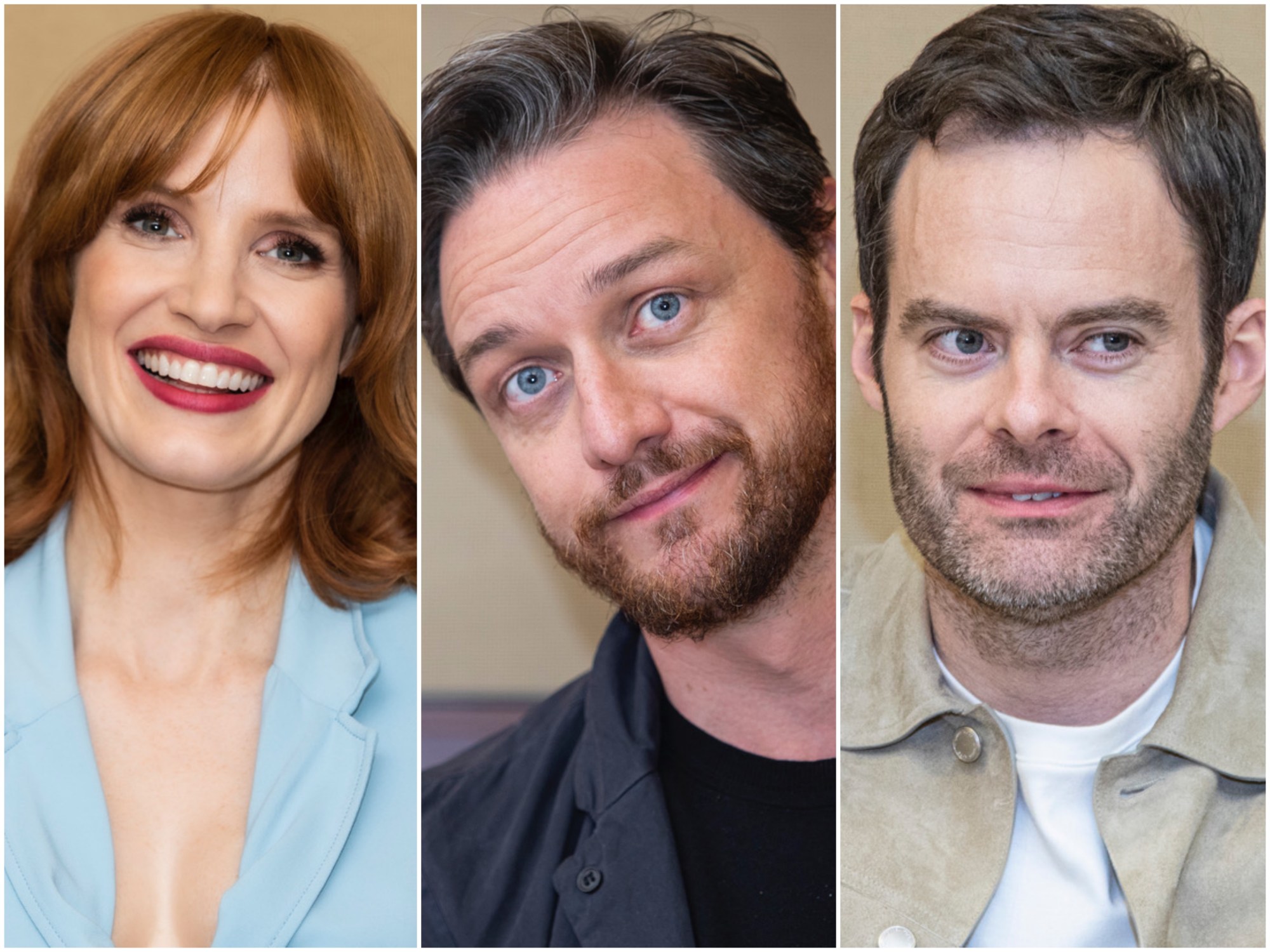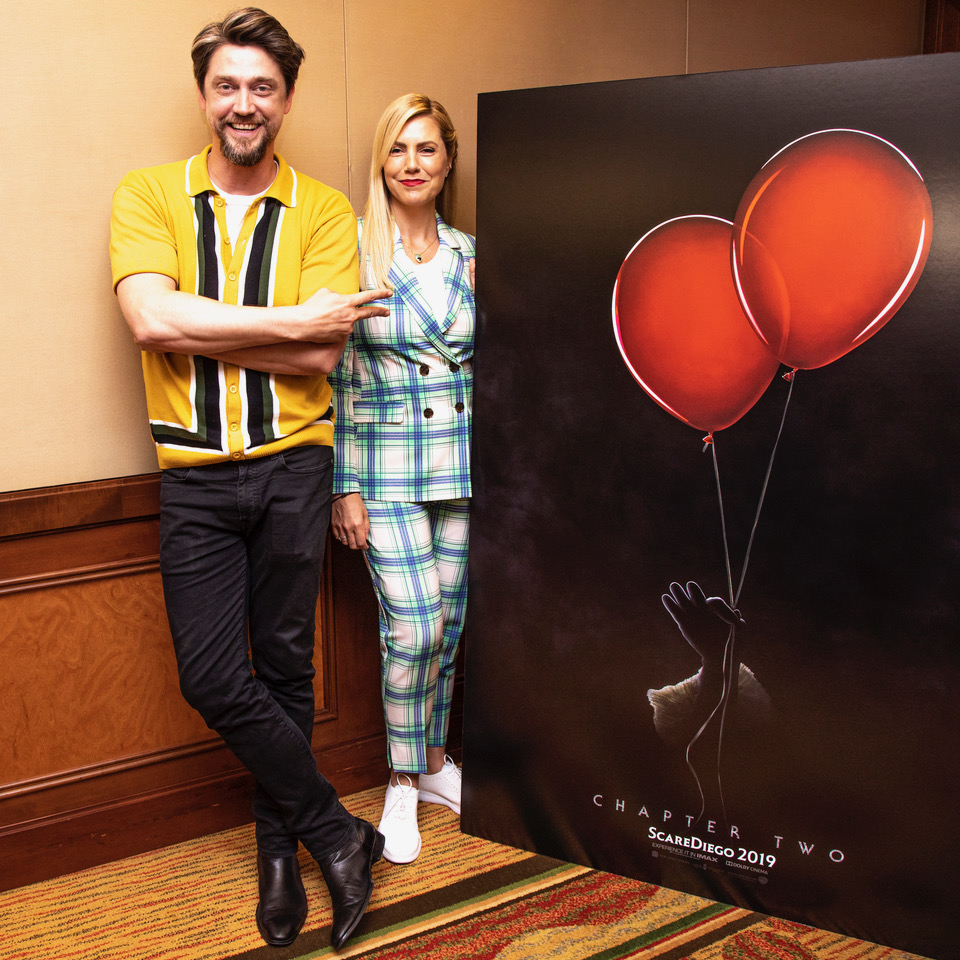
- Interviews
The Cast of ‘It: Chapter Two’ Talks About Tapping Into Trauma
The themes of trauma and the loss of innocence are universal, and the horror genre, of course, has historically served as a pressure release valve for the metaphorical exploration of all types of issues with which society at large is grappling. But the bifurcated structure of Stephen King’s 1986 novel It, and the unique perspective of director Andy Muschietti’s one-two horror punch makes for one of the most interesting big-screen, mainstream genre experiments in recent memory.
In 2017, It grossed over $700 million at the worldwide box office, telling the story of a group of kids doing battle with Pennywise (Bill Skarsgård), an ancient, trans-dimensional malevolent spirit who assumes the form of whatever one fears most. It: Chapter Two, then, flashes forward 27 years, to the next feeding time for this ghoulish presence, and finds the same group, now adults (Jessica Chastain, James McAvoy, Bill Hader, James Ransone, Isaiah Mustafa, Jay Ryan, and Andy Bean), rekindling deep and powerful bonds forged from this hellish shared experience, and attempting to defeat Pennywise once and for all.
It’s a story that each cast member appreciates for its depth and emotional layering — something they attribute to King’s source material. “What I loved so much about his writing is that the monsters were us,” shared Chastain during a stop by the HFPA Comic-Con lounge. “It was what we were capable of psychologically. Like, in Pet Sematary, (it explores) this idea of what happens if you can’t let go, you can’t move on? Or in Misery, it explores this sense of obsession. (His writing is) never just about outside entities, it’s what we are capable of, ourselves. Stephen King is so fascinating, and with this film, so much of what it’s about is these characters coming to terms with the trauma of their lives.”
Balanced with It’s flinty examination of inner demons and damaged characters is a pinch of wider sociopolitical commentary — at least in the view of some cast members. “There was an incident in the town where Stephen King grew up that was gay-bashing. And there was a murder,” noted Chastain. “And that’s what started King into creating the world of Pennywise, this town of Derry, and the dark underside of what was happening in this town. So I definitely think there’s a political edge to this book.”
McAvoy, meanwhile, disagrees only slightly, noting that any such commentary is in his opinion linked to human fallibility more broadly rather than anything which could be considered topical or even necessarily modern. “I don’t think Stephen has ever tried to make a political statement,” said McAvoy. “I think he’s just trying to tell a story. But I do think that he’s a product of the environment that he is living in, and that he can’t help but respond to that and react to that and be stimulated by that. There’s a darkness in Derry, a putrid vein that runs through it, which is partly why it’s perfect for Pennywise to lay low there for 27 years in between coming out and feeding. And that darkness that resides in that small town is maybe something that is not necessarily pertinent to just right now, but pertinent to I think human society all the time — this capacity we have to be civilized and come together, but at the same time be perverted as well. That’s quite an interesting thing that I see in society, and we see it all the time — that deplorable things are about to happen in an apparently civilized town or city or wherever.”

Director Andy Muschietti and his sister, writer and producer Barbara Muschietti.
armando gallo/hfpa
“You could take Pennywise out of the film and still have a coming-of-age story,” continued McAvoy, “about a bunch of people that have suffered trauma, either through loss or physical or psychological abuse, and are overcoming that by finding kinship and friendship, and finding agency in all of those things. And that would still be a really good film that would be a bit more like Stand by Me without a road movie element to it. But you put (Pennywise) in it, and it gives it this mythical, almost legendary (feeling) that elevates it I think.”
Giving ultimate shape to all these nightmare battles, though, the cast all agrees, is the unifying — if exacting — vision of Argentinean-born director Muschietti, known for his penchant for many takes.
“Well, he’s learned English definitely a lot better than when we worked on Mama,” said Chastain with a laugh. “Doing scenes, he sometimes just yells stuff out when you’re acting (to get a different reaction), and when I was doing Mama, one time he just yelled, ‘Government!’ And I was like, ‘Government? I don’t know what that means!’”
“He’s an amazing artist, he’s an amazing musician, and he can do all these things,” said Hader. “And it shows that he’s an artist because he has an incredible eye for detail and is still very in tune with what your character is going through in every moment. But because he has that artist’s eye, every single thing in the frame matters. We talk about (doing) a lot of takes, but I think it’s for good reason because he has this tapestry in his head that’s moving, and he wants it all to move in the right way. In fact, I just sent the trailer to some friends, one of whom is a filmmaker, and he wrote back and said, ‘Every shot of this trailer is like a painting.’ And that’s Andy.”
“Andy has so much joy and enthusiasm and obsession with what he’s creating that it brings you along for the ride,” Chastain continued. “If I’m talking to him and I have a question about something, he can draw me a picture of what it is, and it’s incredible. If we’re talking about a love story or a theme, he can play me something that he’s working on. He really is, more than anyone else I’ve ever met, like a Renaissance man, his talents kind of go everywhere. And working with someone like that who’s also very, very lovely — both he and his sister Barbara and I are very close, we’re like family — you feel (as if) you’d follow him anywhere.”
He’s only three feature films into his career, but audiences have thus far clearly shown similar feelings toward Muschietti, one of the more intriguing new directors of his generation.